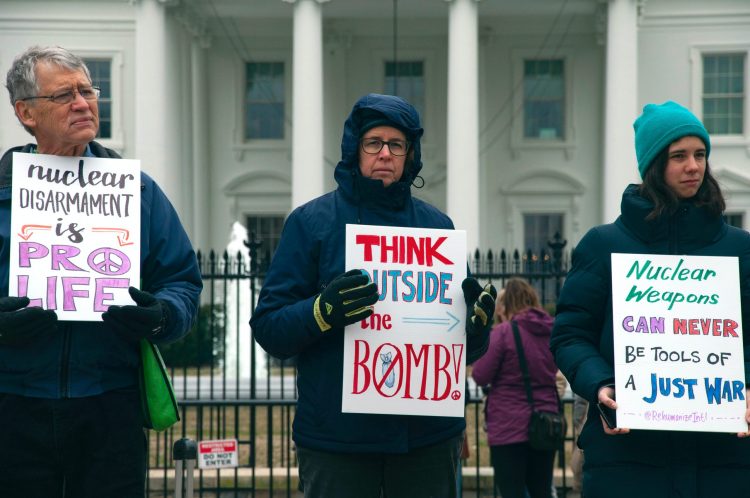- 21 Oct, 2023
- 0
- John LaForge
- John LaForge
NATO’s Steadfast Noon Is Ready-made Doom
NATO’s Steadfast Noon Is Ready-made Doom
by John LaForge
600 words
On October 16, during the NATO-supplied, nuclear-armed hot war in Ukraine, the alliance began its annual nuclear attack rehearsal dubbed “Steadfast Noon.” This practice involves air forces from 13 countries, the “exercising” of fighter jets and U.S. B-52s, lasts until October 26, and will be roaring over Italy, Croatia and the eastern Mediterranean — not far from two aircraft carrier battle groups charging toward the war over the Gaza Strip.
A hundred people joined an October 13 protest outside Germany’s Nörvenich Air Base calling for cancellation of the rehearsal, to no avail.
NATO Sec. Gen. Jens Stoltenberg naturally said, “Our exercise will help to ensure the credibility, effectiveness and security of our nuclear deterrent.” This is shrewd, silk tie talk about threatening nuclear attacks, threats barely distinguishable from Putin’s verbal warnings. NATO claims, “[T]he fundamental purpose of NATO’s nuclear capability is to preserve peace, prevent coercion and deter aggression.”
Aware that this fundamental purpose was disproved and vaporized by Russia’s 2022 invasion of Ukraine, NATO practices nuclear attacks. Steadfast Noon is a role-play for pilots, a dry run to test classroom preparations made at the German branch of the U.S. Air Force Nuclear College on Ramstein Air Base. According to the AFNC website, the school “is responsible for delivering, sustaining and supporting air-delivered nuclear weapon systems for our warfighters … every day.” Some such air-delivered nuclear weapons are the U.S. “B61” free-fall gravity bombs stationed in Germany, Italy, the Netherlands, Belgium and Turkey.
One Nuclear College course named “Theater Nuclear Operation” was described this way (before the page was taken down):
“[A] 4.5-day course that provides training for planners, support staff, targeteers, and staff nuclear planners for joint operations and targeting.” Another class is said to provide: “proficiency in importing and creating target models, developing attack plans using conventional or nuclear weapons, performing consequence assessment to WMD scenarios.”
If you imagined that nuclear war is unthinkable, this school says its fighter jet pilot students, “will be able to import, edit, and modify target sites”; “calculate probabilistic attacks against predefined targets; [and] “develop attack plans using either conventional or nuclear weapons.”
These B61s are just the U.S. nukes closest to Moscow. Add to these the French, British and U.S. thermonuclear weapons on submarines, long-range missiles, and bombers (totals are approximately 5244 U.S., 225 British, and 290 French).
At the protest in Nörvenich, Ludo De Brabander, from the Belgian peace group Peace Now, spoke of the 10 to 20 B61s stationed at Kleine Brogel Air Base in Belgium:
“These bombs will soon be replaced by new B61-12 nuclear bombs. Because of their ‘precision’ and ‘low yield,’ these nuclear weapons are considered ‘operational,’ lowering the threshold for nuclear war. All of this is happening without any official explanation or public debate.”
The concept of suicidal ideation applies to steadfast planning or the actual launch of nuclear weapons attacks. Daniel Ellsberg, in Things That Can and Cannot Be Said (Haymarket Books 2016), said, “[O]ur private, top-secret estimates were that we would kill every European, a hundred million Europeans, without a single U.S. or Soviet warhead landing on West Europe. Just from the fallout of the attacks we were planning on Russia and East Europe. One hundred million.”
So Steadfast Noon is not just code language, or public relations. The event is a large-scale, psychological operation intended to teach us to pretend that nuclear attacks can do good. Of course if nuclear firestorms saved lives and ended war — as U.S. mythology goes with Hiroshima and Nagasaki — then the Pentagon would have used them in Korea, Vietnam, Afghanistan and Iraq. People love to be fooled.
###
John LaForge, syndicated by PeaceVoice, is Co-director of Nukewatch, a peace and environmental justice group in Wisconsin, and is co-editor with Arianne Peterson of Nuclear Heartland, Revised: A Guide to the 450 Land-Based Missiles of the United States.
© 2023 PeaceVoice

john-laforge